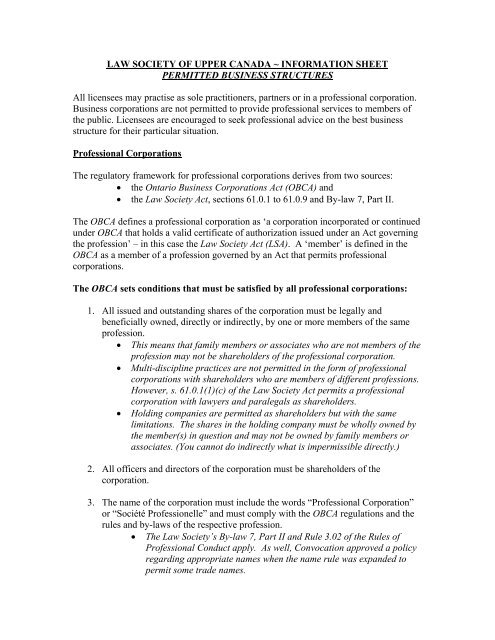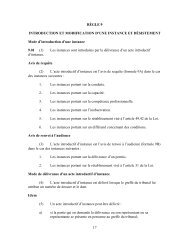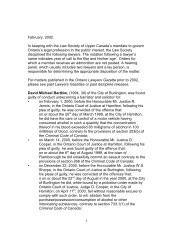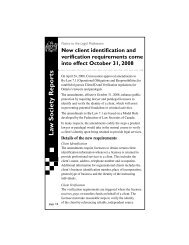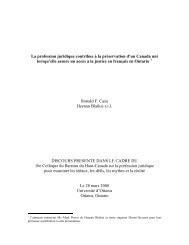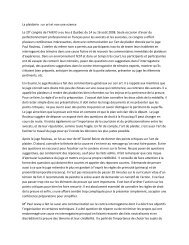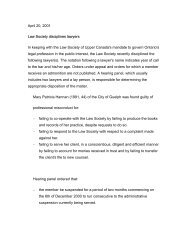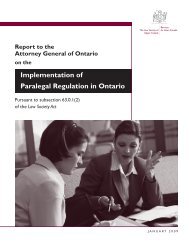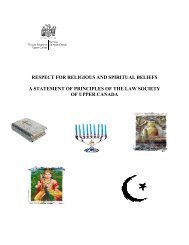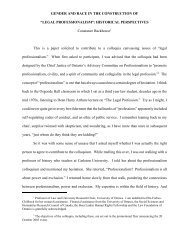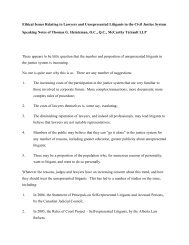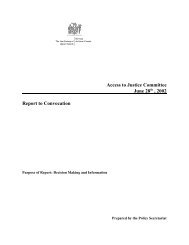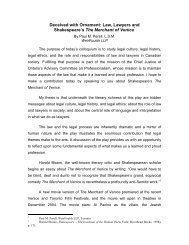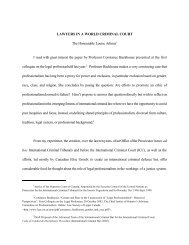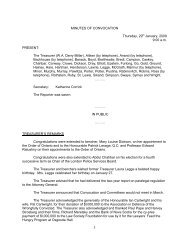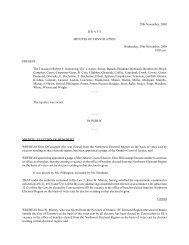Permitted Business Structures - The Law Society of Upper Canada
Permitted Business Structures - The Law Society of Upper Canada
Permitted Business Structures - The Law Society of Upper Canada
You also want an ePaper? Increase the reach of your titles
YUMPU automatically turns print PDFs into web optimized ePapers that Google loves.
LAW SOCIETY OF UPPER CANADA ~ INFORMATION SHEET<br />
PERMITTED BUSINESS STRUCTURES<br />
All licensees may practise as sole practitioners, partners or in a pr<strong>of</strong>essional corporation.<br />
<strong>Business</strong> corporations are not permitted to provide pr<strong>of</strong>essional services to members <strong>of</strong><br />
the public. Licensees are encouraged to seek pr<strong>of</strong>essional advice on the best business<br />
structure for their particular situation.<br />
Pr<strong>of</strong>essional Corporations<br />
<strong>The</strong> regulatory framework for pr<strong>of</strong>essional corporations derives from two sources:<br />
• the Ontario <strong>Business</strong> Corporations Act (OBCA) and<br />
• the <strong>Law</strong> <strong>Society</strong> Act, sections 61.0.1 to 61.0.9 and By-law 7, Part II.<br />
<strong>The</strong> OBCA defines a pr<strong>of</strong>essional corporation as ‘a corporation incorporated or continued<br />
under OBCA that holds a valid certificate <strong>of</strong> authorization issued under an Act governing<br />
the pr<strong>of</strong>ession’ – in this case the <strong>Law</strong> <strong>Society</strong> Act (LSA). A ‘member’ is defined in the<br />
OBCA as a member <strong>of</strong> a pr<strong>of</strong>ession governed by an Act that permits pr<strong>of</strong>essional<br />
corporations.<br />
<strong>The</strong> OBCA sets conditions that must be satisfied by all pr<strong>of</strong>essional corporations:<br />
1. All issued and outstanding shares <strong>of</strong> the corporation must be legally and<br />
beneficially owned, directly or indirectly, by one or more members <strong>of</strong> the same<br />
pr<strong>of</strong>ession.<br />
• This means that family members or associates who are not members <strong>of</strong> the<br />
pr<strong>of</strong>ession may not be shareholders <strong>of</strong> the pr<strong>of</strong>essional corporation.<br />
• Multi-discipline practices are not permitted in the form <strong>of</strong> pr<strong>of</strong>essional<br />
corporations with shareholders who are members <strong>of</strong> different pr<strong>of</strong>essions.<br />
However, s. 61.0.1(1)(c) <strong>of</strong> the <strong>Law</strong> <strong>Society</strong> Act permits a pr<strong>of</strong>essional<br />
corporation with lawyers and paralegals as shareholders.<br />
• Holding companies are permitted as shareholders but with the same<br />
limitations. <strong>The</strong> shares in the holding company must be wholly owned by<br />
the member(s) in question and may not be owned by family members or<br />
associates. (You cannot do indirectly what is impermissible directly.)<br />
2. All <strong>of</strong>ficers and directors <strong>of</strong> the corporation must be shareholders <strong>of</strong> the<br />
corporation.<br />
3. <strong>The</strong> name <strong>of</strong> the corporation must include the words “Pr<strong>of</strong>essional Corporation”<br />
or “Société Pr<strong>of</strong>essionelle” and must comply with the OBCA regulations and the<br />
rules and by-laws <strong>of</strong> the respective pr<strong>of</strong>ession.<br />
• <strong>The</strong> <strong>Law</strong> <strong>Society</strong>’s By-law 7, Part II and Rule 3.02 <strong>of</strong> the Rules <strong>of</strong><br />
Pr<strong>of</strong>essional Conduct apply. As well, Convocation approved a policy<br />
regarding appropriate names when the name rule was expanded to<br />
permit some trade names.
• <strong>The</strong> words “Pr<strong>of</strong>essional Corporation” must appear in full and not<br />
separated by other words or punctuation. This replaces Inc., Corp., or<br />
other forms that identify corporations.<br />
4. <strong>The</strong> corporation may not have a number name.<br />
5. <strong>The</strong> articles <strong>of</strong> incorporation must provide that the corporation may not carry on<br />
business other than the practice <strong>of</strong> the pr<strong>of</strong>ession, but this does not prevent the<br />
corporation from carrying on activities related to the practice <strong>of</strong> the pr<strong>of</strong>ession,<br />
including the temporary investment <strong>of</strong> surplus funds earned by the corporation.<br />
• This restriction must be included in the articles <strong>of</strong> incorporation <strong>of</strong> the<br />
pr<strong>of</strong>essional corporation submitted to the <strong>Law</strong> <strong>Society</strong> submitted with<br />
an application for a certificate <strong>of</strong> authorization.<br />
<strong>The</strong> OBCA also provides that pr<strong>of</strong>essional liability is not affected by practising through a<br />
pr<strong>of</strong>essional corporation.<br />
<strong>Law</strong> <strong>Society</strong>’s By-law 7, Part II<br />
A pr<strong>of</strong>essional corporation may not start practice without first obtaining a certificate <strong>of</strong><br />
authorization from the <strong>Law</strong> <strong>Society</strong>. (Only a corporation composed <strong>of</strong> persons licensed<br />
by the <strong>Law</strong> <strong>Society</strong> may apply). Application is a two-step process:<br />
• First, the <strong>Law</strong> <strong>Society</strong> must approve the corporate name to be used<br />
• Second, the pr<strong>of</strong>essional corporation’s articles <strong>of</strong> incorporation must<br />
be approved by applying for a Certificate <strong>of</strong> Authorization<br />
<strong>Permitted</strong> Names<br />
• A pr<strong>of</strong>essional corporation may not use the name <strong>of</strong> another pr<strong>of</strong>essional<br />
corporation or a name that is confusingly similar. <strong>The</strong> name may include that <strong>of</strong><br />
any shareholder <strong>of</strong> the corporation, except a shareholder who becomes a member<br />
<strong>of</strong> a tribunal or any other <strong>of</strong>fice with duties incompatible with the practice <strong>of</strong> the<br />
pr<strong>of</strong>ession.<br />
• <strong>The</strong> pr<strong>of</strong>essional corporation may retain the name <strong>of</strong> a deceased licensee who<br />
practised law or provided legal services through the corporation, or a deceased<br />
shareholder <strong>of</strong> the pr<strong>of</strong>essional corporation.<br />
• <strong>The</strong> pr<strong>of</strong>essional corporation’s name may include the phrases “and Associates” or<br />
“and Company” if three or more licensees practice law and/or provide legal<br />
services through the pr<strong>of</strong>essional corporation. (A paralegal associate would be an<br />
employee <strong>of</strong> the pr<strong>of</strong>essional corporation in which they provide legal services).<br />
• In October 2006, Convocation clarified that a person cannot be considered an<br />
‘associate’ if the person is the principal or employee <strong>of</strong> another entity.<br />
2
• In May 2004, Convocation approved criteria for assessing whether a name is<br />
misleading. For example, names may not include,<br />
o reference to specific geographic locations, government agencies, public or<br />
charitable legal services organizations, other non-legal corporate entities,<br />
cultural, racial, ethnic or religious groups or organizations, existing law<br />
firms, or other entities or organizations (e.g. “Osgoode Hall <strong>Law</strong><br />
Pr<strong>of</strong>essional Corporation”);<br />
o language that implies the firm is the only or the best firm, or would be<br />
misleading as to the number <strong>of</strong> licensees practising in the firm or their<br />
status;<br />
o implying the existence <strong>of</strong> a partnership, affiliation, or association between<br />
licensees when no such relationship exists;<br />
o language that is specifically prohibited by statute or that is demeaning,<br />
degrading or derogatory.<br />
Certificate <strong>of</strong> Authorization<br />
Applications for a Certificate <strong>of</strong> Authorization must include<br />
• the application form,<br />
• the articles <strong>of</strong> incorporation (and where necessary articles <strong>of</strong><br />
amalgamation or articles <strong>of</strong> continuance) and<br />
• the application fee.<br />
<strong>The</strong> certificate will be issued if,<br />
• the corporation complies with OBCA and LSA requirements for a pr<strong>of</strong>essional<br />
corporation,<br />
• the name <strong>of</strong> the pr<strong>of</strong>essional corporation complies with OBCA and <strong>Law</strong> <strong>Society</strong><br />
requirements and policies,<br />
• the directors are licensees none <strong>of</strong> whose licence has been suspended, and<br />
• the individuals who will practise law or provide legal services through the<br />
corporation are licensed by the <strong>Law</strong> <strong>Society</strong> to do so.<br />
<strong>The</strong> certificate is valid until December 31 <strong>of</strong> the year <strong>of</strong> its issue and must be renewed<br />
annually by way <strong>of</strong> an application with a renewal fee. Renewal applications must be<br />
received 90 days before the certificate’s expiry date. <strong>The</strong> renewal certificate is valid until<br />
December 31 <strong>of</strong> the year for which it is renewed.<br />
A replacement certificate may be issued for a fee if a certificate is lost or there is a<br />
change <strong>of</strong> information. <strong>The</strong> replacement certificate is valid until December 31 in the year<br />
it is issued.<br />
<strong>The</strong> pr<strong>of</strong>essional corporation must apply to the <strong>Law</strong> <strong>Society</strong> to surrender the certificate <strong>of</strong><br />
authorization if the corporation does not wish to renew its certificate, no longer wishes to<br />
practise law or provide legal services in Ontario, or wishes to voluntarily wind up or<br />
dissolve.<br />
3


